Non-violent action is key to Sudan, says Nobel Peace nominee
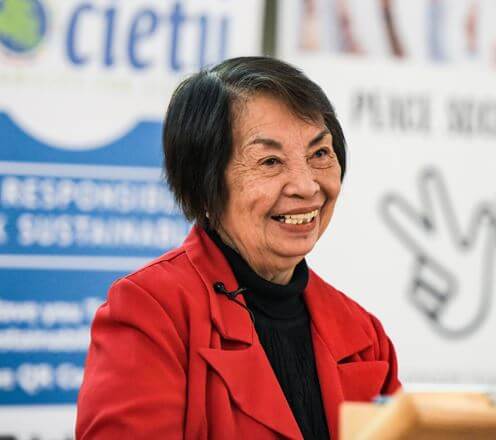
NOBEL Peace Prize nominee Irene Santiago, who helped end a 50-year conflict in her native Philippines, has urged women in Sudan to organise non-violent action.
Ms Santiago, recognised as one of the world’s most outstanding women peacemakers, told guests at the University of Bradford that bringing in another violent force to end fighting between the Sudanese army and paramilitary group, Rapid Support Forces, is not the answer.
She said: “There are two groups of men trying to gain power. How do you stop them? Talking to them? I don’t think that’s going to work.
“If there are many of us and we’re organised, you have to listen to us. Get organised, show that you’re a constituency that matters. They will see the power in the people who are organised. Women are very good organisers.
“If you have another violent force, nothing is going to happen.”
She even offered her wealth of experience, adding: “I want to go to Sudan.”
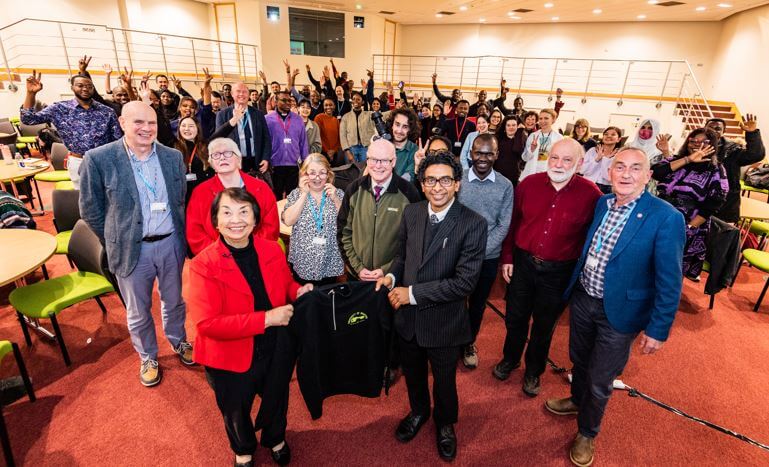 Pictured above: Irene was presented with a University of Bradford sweater by Professor Anand
Pictured above: Irene was presented with a University of Bradford sweater by Professor Anand
Ms Santiago travelled to the UK from the Philippines to deliver this year’s Adam Curle lecture on “A Feminist Does Peacebuilding” at the University’s Department of Peace Studies and International Development.
She has spent 40 years in conflict negotiation, both at a local level as well as working with the UN, and was nominated for the Nobel Peace Prize in 2005.
She warned that attempts to achieve equality for men and women have resulted in a weakening of the women’s movement in the last few decades.
She said: “The women’s movement has weakened since 1995 because of gender mainstreaming. We focused on the technical but forgot we need to keep organising politically in order to be taken seriously.
“When you’re not implementing change, you get down a bit and it’s very difficult to get back up.”
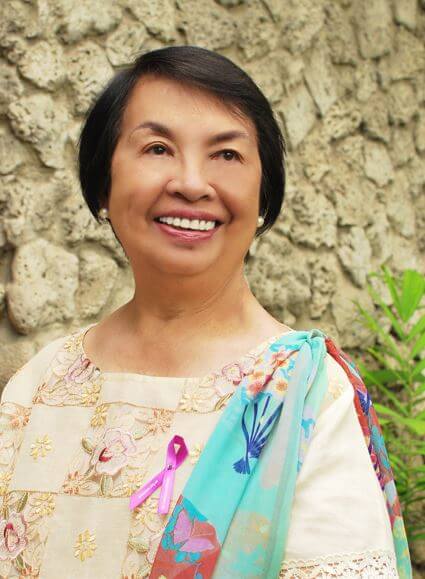
Pictured above: Irene in her native Philippines
Ms Santiago’s lecture coincides with the golden anniversary of the UK’s first Peace Studies school, founded in Bradford in 1973, and named after its inaugural Chair, Adam Curle.
The school was launched through a crowdfunding drive by a group of northern Quakers and has established itself as one of the world’s leading centres of conflict resolution and international development.
Ms Santiago explained that she became a feminist after going to a Quakers seminar on “The changing woman in a changing South East Asia,” also in 1973.
She said: “What foresight the Quakers had. Like your department, this year is also my 50th year.”
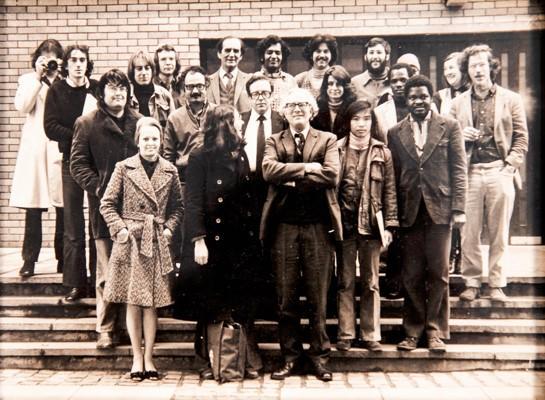
Pictured above: The first Peace Studies staff picture with Adam Curle (centre, front)
A former journalist who puts her confidence down to her father teaching her how to speak in public when she was 11, Ms Santiago’s Peace 911 programme put an end to a decades-long violent conflict in the Paquibato district of the Philippines within just nine months of implementation. She is currently rolling out the programme to other parts of the country as Senior Adviser on Peacebuilding of the Local Government Academy of the Department of Interior and Local Government.
And the secret of her success? Being a “badly behaved woman.”
She told attendees: “I couldn’t be prim and proper to do proper peacebuilding and peacemaking. Badly behaved meant trying to understand and challenge the rules for promoting fairness and justice."
From telling her husband to hire a cook if he wanted good food to recommending having a ‘Go to Hell’ fund to give a person autonomy over their life, it’s clear Ms Santiago is a rebel at heart.
She said: “Behaving badly is pre-empting the destiny laid out for women by patriarchy.
“Behaving badly as a feminist makes one adept at organising mayhem and movement that leads to change.”
Finding her voice
One example she gave was when she put a Government minister firmly in his place to achieve a ceasefire agreement between the Philippines government and the Moro Islamic Liberation Front (MILF).
In 2001, President Gloria Macapagal Arroyo was on a state visit to Malaysia during which she wanted a ceasefire agreement signed.
Ms Santiago, who is affectionately nicknamed Inday Santiago - or ‘Beloved Daughter Santiago’, said: “The Secretary of National Defence was one of the Philippine officials waiting at the airport for the President.
“When he saw our Panel Chairman, he said quite sternly: ‘You are not signing the ceasefire agreement!’
“The Chairman was taken aback and momentarily lost his voice. I don’t know where I drew it from but I found my voice. I shot back and said, ‘And who are you? Are you the approving authority? The President has already instructed us to sign.'
“Then I dropped a bombshell: ‘Besides, I have already signed the agreement.’”
In fact, it was a bluff - but her bold tactics worked. Two hours later, Irene herself signed the ceasefire agreement.
She added: “I wasn’t supposed to sign it but I did because there was no one else there except the Chairman and me so he designated me Head of the Technical Working Group to sign the agreement. And that’s how I got to sign that historic ceasefire agreement.”
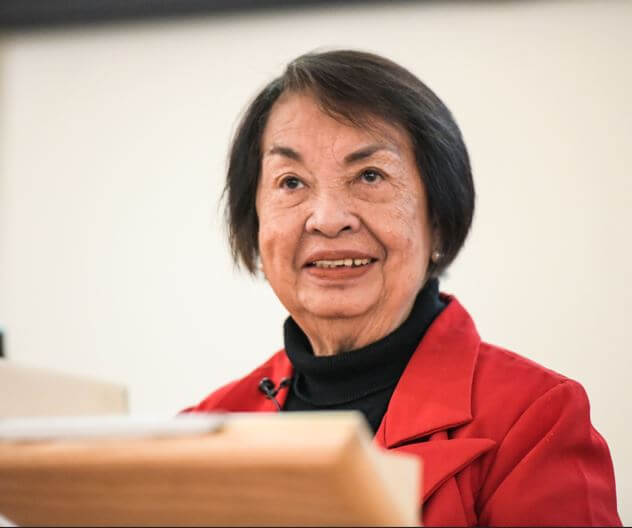
Pictured above: Irene speaking at the University of Bradford
The biggest lesson she learned was at the start of her activism, when she began organising women in poor Muslim communities on Mindanao, the second largest island in the Philippines.
She said: “They taught me no one empowers anyone else. Anybody who says - and I find this in many mission statements of many organisations - they are ‘empowering’ the people, doesn’t know what she or he is doing.
“It is also terribly arrogant. The decision to empower oneself is made only by that person. No one else can do that for him or her.”
Professor PB Anand, Head of Department for Peace Studies and International Development, said: "We were privileged to have Irene Santiago deliver the third annual Adam Curle lecture, named after our first Chair of Peace Studies, who launched the school 50 years ago. Irene has put into practise the ambitious ideas Adam Curle wrote about when he first came to Bradford.
"It also feels very fitting that Irene came to talk about feminism in peacebuilding at a University where both our Chancellor and Vice-Chancellor are women, in a city where the leader of the council is a woman and in a county where the mayor is a woman.
“Her inspiring lecture has fired up the zeal and motivation of our students and I believe all of us who were lucky enough to hear it will now think about the world a little differently.”
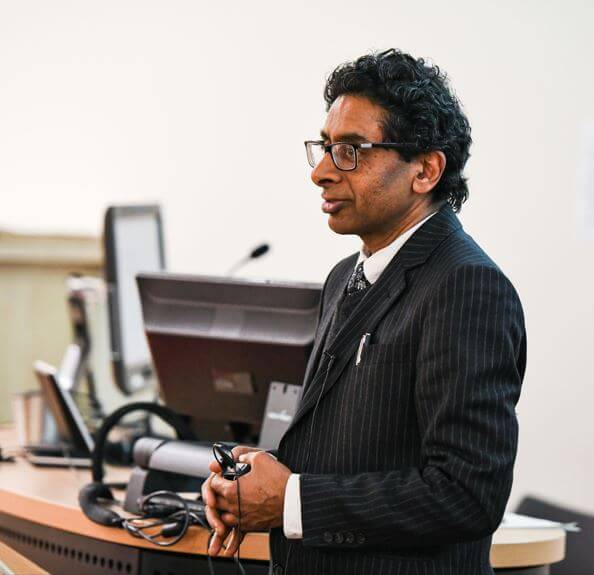
Pictured above: Professor Anand speaking at the Adam Curle lecture
Student and President of the University's Peace Studies Society, Juanita Serrano Zapata, said: "If I can sum up the conference in one word, it would be 'magic.' We absorbed and reflected about activism, feminism, and peace building. Irene's speech was inspiring and encouraging to continue our path as peace builders and change makers."
Peace Studies continues to celebrate its 50th anniversary with an event for invited guests at the House of Lords next month as well as a conference in September.
